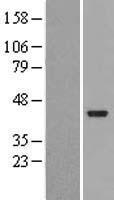FTS (AKTIP) (NM_001012398) Human Tagged ORF Clone
CAT#: RC210569
AKTIP (Myc-DDK-tagged)-Human AKT interacting protein (AKTIP), transcript variant 1
"NM_001012398" in other vectors (6)
Specifications
| Product Data | |
| Type | Human Tagged ORF Clone |
| Tag | Myc-DDK |
| Symbol | AKTIP |
| Synonyms | FT1; FTS |
| Vector | pCMV6-Entry |
| E. coli Selection | Kanamycin (25 ug/mL) |
| Mammalian Cell Selection | Neomycin |
| Sequence Data |
>RC210569 ORF sequence
Red=Cloning site Blue=ORF Green=Tags(s) TTTTGTAATACGACTCACTATAGGGCGGCCGGGAATTCGTCGACTGGATCCGGTACCGAGGAGATCTGCC GCCGCGATCGCC ATGAACCCTTTCTGGAGCATGTCTACAAGCTCTGTACGCAAACGATCTGAAGGTGAAGAGAAGACATTAA CAGGGGACGTGAAAACCAGTCCTCCACGAACTGCACCAAAGAAACAGCTGCCTTCTATTCCCAAAAATGC TTTGCCCATAACTAAGCCTACATCTCCTGCCCCAGCAGCACAGTCAACAAATGGCACGCATGCGTCCTAT GGACCCTTCTACCTGGAATACTCTCTTCTTGCAGAATTTACCTTGGTTGTGAAGCAGAAGCTACCAGGCG TCTATGTGCAGCCATCTTATCGCTCTGCATTAATGTGGTTTGGAGTAATATTCATACGGCATGGACTTTA CCAAGATGGCGTATTTAAGTTTACAGTTTACATCCCTGATAACTATCCAGATGGTGACTGTCCACGCTTG GTGTTCGATATTCCTGTCTTTCACCCGCTAGTTGATCCCACCTCAGGTGAGCTGGATGTGAAGAGAGCAT TTGCAAAATGGAGGCGGAACCATAATCATATTTGGCAGGTATTAATGTATGCAAGGAGAGTTTTCTACAA GATTGATACAGCAAGCCCCCTGAACCCAGAGGCTGCAGTACTGTATGAAAAAGATATTCAGCTTTTTAAA AGTAATGTTGTTGACAGTGTTAAGGTGTGCACTGCTCGTTTGTTTGACCAACCTAAAATAGAAGACCCCT ATGCAATTAGCTTTTCTCCATGGAATCCTTCTGTACATGATGAAGCCAGAGAAAAGATGCTGACTCAGAA AAAGAAGCCTGAAGAACAGCACAATAAAAGTGTTCATGTTGCTGGCCTGTCATGGGTAAAGCCTGGCTCA GTACAGCCTTTCAGTAAAGAAGAGAAAACAGTGGCGACT ACGCGTACGCGGCCGCTCGAGCAGAAACTCATCTCAGAAGAGGATCTGGCAGCAAATGATATCCTGGATT ACAAGGATGACGACGATAAGGTTTAA >RC210569 protein sequence
Red=Cloning site Green=Tags(s) MNPFWSMSTSSVRKRSEGEEKTLTGDVKTSPPRTAPKKQLPSIPKNALPITKPTSPAPAAQSTNGTHASY GPFYLEYSLLAEFTLVVKQKLPGVYVQPSYRSALMWFGVIFIRHGLYQDGVFKFTVYIPDNYPDGDCPRL VFDIPVFHPLVDPTSGELDVKRAFAKWRRNHNHIWQVLMYARRVFYKIDTASPLNPEAAVLYEKDIQLFK SNVVDSVKVCTARLFDQPKIEDPYAISFSPWNPSVHDEAREKMLTQKKKPEEQHNKSVHVAGLSWVKPGS VQPFSKEEKTVAT TRTRPLEQKLISEEDLAANDILDYKDDDDKV |
| Chromatograms |
CHROMATOGRAMS
 Sequencher program is needed, download here. |
| Restriction Sites |
SgfI-MluI
Cloning Scheme for this gene
Plasmid Map

|
| ACCN | NM_001012398 |
| ORF Size | 879 bp |
| OTI Disclaimer | The molecular sequence of this clone aligns with the gene accession number as a point of reference only. However, individual transcript sequences of the same gene can differ through naturally occurring variations (e.g. polymorphisms), each with its own valid existence. This clone is substantially in agreement with the reference, but a complete review of all prevailing variants is recommended prior to use. More info |
| OTI Annotation | This clone was engineered to express the complete ORF with an expression tag. Expression varies depending on the nature of the gene. |
| Product Components | The ORF clone is ion-exchange column purified, transfection-ready dried plasmid DNA, and shipped with 2 vector sequencing primers. |
| Reconstitution | 1. Centrifuge at 5,000xg for 5min. 2. Carefully open the tube and add 100ul of sterile water to dissolve the DNA. 3. Close the tube and incubate for 10 minutes at room temperature. 4. Briefly vortex the tube and then do a quick spin (less than 5000xg) to concentrate the liquid at the bottom. 5. Store the suspended plasmid at -20°C. The DNA is stable for at least one year from date of shipping when stored at -20°C. |
| Reference Data | |
| RefSeq | NM_001012398.1, NM_001012398.2, NP_001012398.1 |
| RefSeq Size | 2222 bp |
| RefSeq ORF | 879 bp |
| Locus ID | 64400 |
| Cytogenetics | 16q12.2 |
| MW | 33.2 kDa |
| Gene Summary | The mouse homolog of this gene produces fused toes and thymic hyperplasia in heterozygous mutant animals while homozygous mutants die in early development. This gene may play a role in apoptosis as these morphological abnormalities are caused by altered patterns of programmed cell death. The protein encoded by this gene is similar to the ubiquitin ligase domain of other ubiquitin-conjugating enzymes but lacks the conserved cysteine residue that enables those enzymes to conjugate ubiquitin to the target protein. This protein interacts directly with serine/threonine kinase protein kinase B (PKB)/Akt and modulates PKB activity by enhancing the phosphorylation of PKB's regulatory sites. Alternative splicing results in two transcript variants encoding the same protein. [provided by RefSeq, Jul 2008] |
Documents
| Product Manuals |
| FAQs |
Resources
Other Versions
| SKU | Description | Size | Price |
|---|---|---|---|
| SC301640 | AKTIP (untagged)-Human AKT interacting protein (AKTIP), transcript variant 1 |
USD 660.00 |
|
| RG210569 | AKTIP (GFP-tagged) - Human AKT interacting protein (AKTIP), transcript variant 1 |
USD 460.00 |
|
| RC210569L1 | Lenti ORF clone of Human AKT interacting protein (AKTIP), transcript variant 1, Myc-DDK-tagged |
USD 768.00 |
|
| RC210569L2 | Lenti ORF clone of Human AKT interacting protein (AKTIP), transcript variant 1, mGFP tagged |
USD 620.00 |
|
| RC210569L3 | Lenti ORF clone of Human AKT interacting protein (AKTIP), transcript variant 1, Myc-DDK-tagged |
USD 620.00 |
|
| RC210569L4 | Lenti ORF clone of Human AKT interacting protein (AKTIP), transcript variant 1, mGFP tagged |
USD 620.00 |
{0} Product Review(s)
Be the first one to submit a review






























































































































































































































































 Germany
Germany
 Japan
Japan
 United Kingdom
United Kingdom
 China
China



